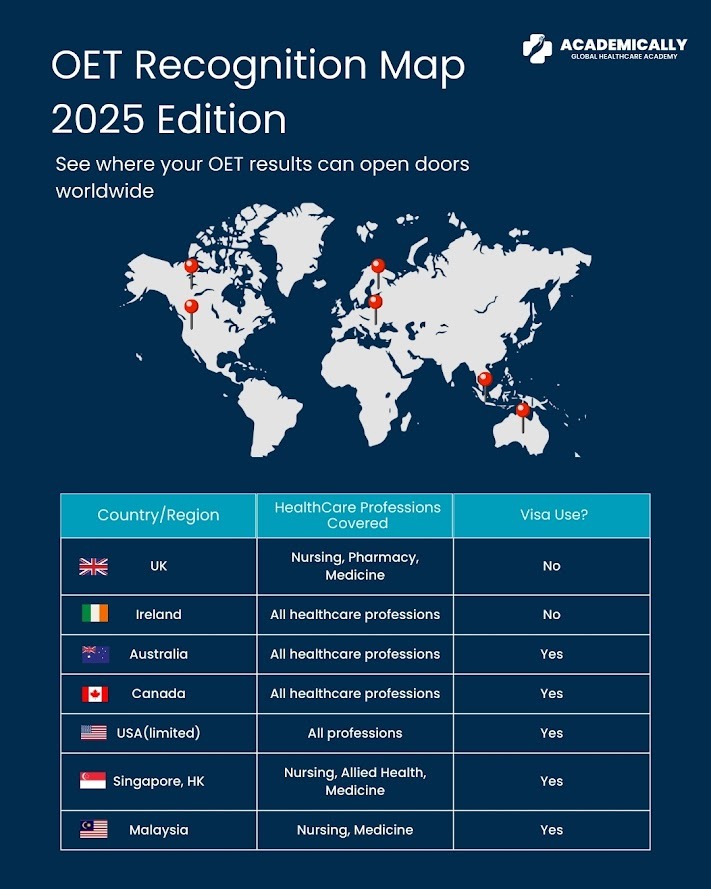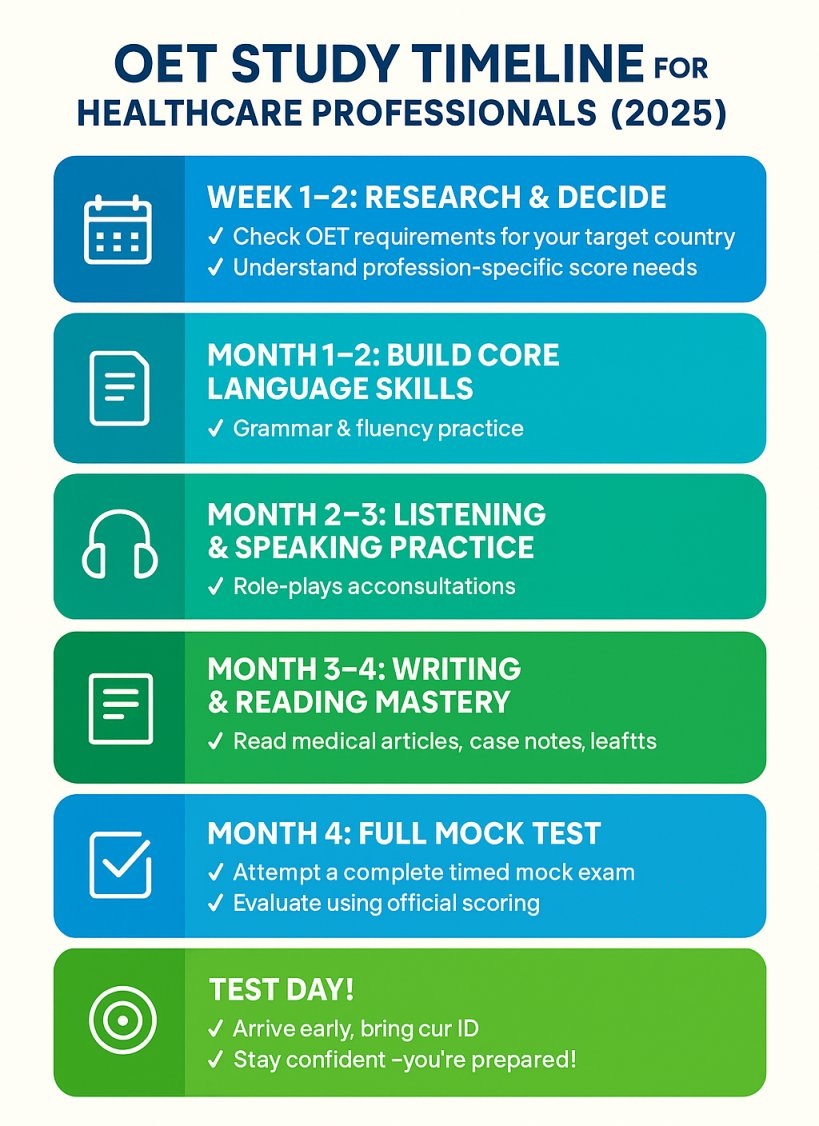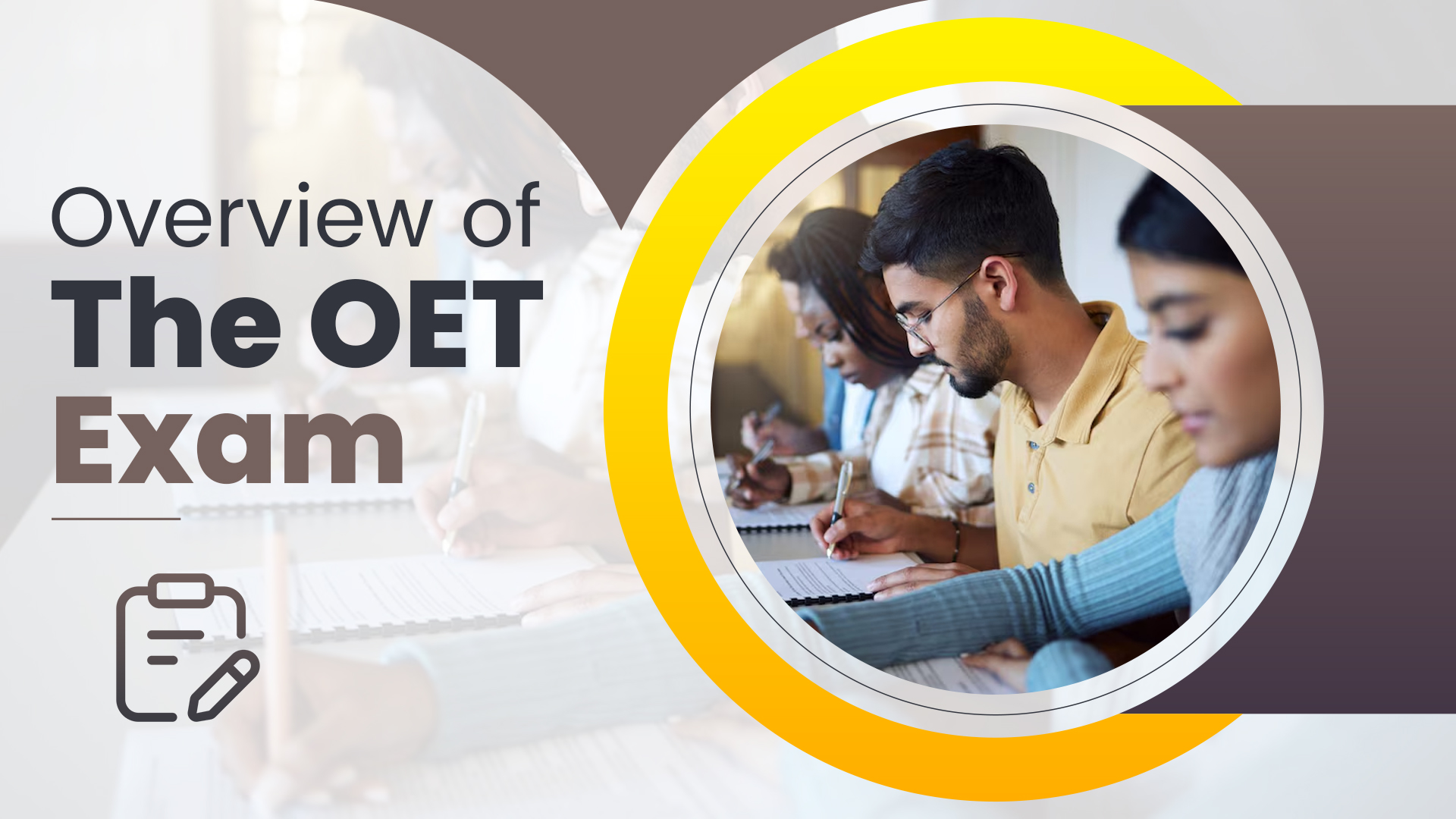Why OET?
A few months back, our team was having a chat with a young pharmacist from India. She’s brilliant, has years of experience, but was facing one major issue inspite of qualifying the licensing exam:
“The Australian Health Practitioner Regulation Agency says I have to prove my English proficiency. But I already speak English! Why this test?”
We hear this all the time from many pharmacists. Even though, the official language of India is English, but countries like the UK, USA, Ireland, Australia, New Zealand, and several gulf countries require English proficiency. Why? Because patient safety is non-negotiable. A slip-up in understanding a doctor’s order, or writing a medication note wrong, can literally be a matter of life. Regulators want to know that you can handle real clinical conversations and documents in English.
And that’s where OET comes in.
What is OET?
OET (Occupational English Test) isn’t just another English proficiency test. It’s designed specifically for healthcare professionals. Unlike generic English tests, OET assesses your communication skills on real-life hospital scenarios at you:
- Talking to worried patients
- Writing referral letters to consultants
- Reading clinical guidelines
- Listening to case discussions between medical staff
And that’s exactly why regulators love it.
Where Can OET Take You in 2025?
United Kingdom: GMC, GPhC, and HCPC all accept OET for registration. That means, every overseas nurses, doctors, pharmacists, and allied health professionals who present a valid and qualifying OET score are good to get registration.
Ireland: Nurses, doctors, and pharmacists all use OET for licensing.
Australia and New Zealand: Both countries accept OET for all healthcare roles, plus visas.
Gulf Countries: UAE, Qatar, Saudi Arabia, and Oman all recognise OET for licensing.
Singapore, Hong Kong, Malaysia: OET is gaining traction in regulatory boards and private hospitals.
Canada: Slowly but surely, Canadian regulators are adding OET, especially for nursing and pharmacy.
USA: Some states started initiating licensure for OET applicants, mainly for nurses, with about pharmacy coming soon.

OET vs IELTS: Which English Proficiency Exam you should appear for?
Many healthcare professionals from across the world ask:
“Is OET really better than IELTS?”
Here’s the deal. Both tests are valid and widely respected. But they’re suitable for different career journey.
How OET and IELTS Compare
Imagine you’re a pharmacist prepping for an English exam.
- In OET, your writing task might be drafting a letter to a doctor explaining why a patient needs an alternative medication.
- In IELTS, you might have to write an essay about global warming or whether social media is good or bad.
See the problem?
Healthcare professionals usually find OET way more relevant. You’re tested on scenarios you’ll face on the job, not on random topics you might never deal with.
| Area | OET | IELTS |
| Context | Medical and healthcare-specific | General topics |
| Writing | Referral letters, discharge notes | Essays on broad subjects |
| Speaking | Patient conversations, role-plays | General interviews |
| Reading | Clinical articles, case notes | Newspaper-type articles |
| Listening | Consultations, handovers | Lectures, conversations |
Bonus points? Regulators know you’re tested on medical communication. That gives them confidence that you’ll be able to communicate seamlessly with patients.
Why OET is a Game-Changer for Pharmacists
Let’s talk pharmacy. In 2025, pharmaceutical regulatory bodies have widely accepted OET as a qualifying English proficiency test. More regulators accept it for licensing:
- UK’s General Pharmaceutical Council (GPhC)
- Pharmaceutical Society of Ireland
- Australian Pharmacy Council
- New Zealand Pharmacy Council
- UAE and other Gulf country regulatory bodies
For pharmacists, the OET tests:
- Patient counselling conversations
- Writing referral letters to doctors
- Reading medication protocols and guidelines
- Listening to drug reviews or interprofessional discussions
Students often say after qualifying OET:
“I struggled with IELTS essays that speaks about history, art, science. But OET’s tasks felt like I’m in a real healthcare setting.”
OET Exam Pattern- What’s the Paper Structure like?
Here’s a breakdown of what pharmacists can expect to see in the OET question paper:
Listening (Approx. 50 minutes)
You can expect to hear a clinical session or a general conversation between doctor and patient. Generally case-based scenario that you’ll assess.
Reading (60 minutes)
Say bye bye to boring history lectures on exam papers. You can expect medical terms that you are familiar with, healthcare-oriented cases and examples.
Writing (45 minutes)
One of the most crucial segments of the exam. You may be asked to write a pharmacy referral letter, prescription notes, case reviews and so on.
Speaking (Approx. 20 minutes)
It is a make or break segment of the exam. You are ought to speak fluently in the chosen country. This segment will determine your skills in communication with patients and healthcare professionals.
Other Healthcare Professions that can sit for OET
Beyond pharmacy, OET has 12 different versions for:
Nursing | Medicine | Dentistry | Occupational Therapy | Physiotherapy | Veterinary Science | Radiography | Speech Pathology | Dietetics | Optometry | Podiatry
Each test uses real-life scenarios from that profession.
OET Scores Explained – 2025 Edition
A common question:
“What’s the passing marks for OET?”
There’s no single pass mark. Each regulator sets its own bar.
Here’s a complete breakdown:
| Regulator | Minimum Score Needed |
| GMC (UK) | B overall |
| GPhC (UK) | B in each skill |
| Australian Pharmacy Council | B overall |
| Nursing Board Ireland | B overall |
| HCPC (UK) Allied Health | B overall |
OET Grade Scale:
- A = 450-500
- B = 350-440
- C+ = 300-340
- C = 200-290
Most regulators require a minimum of Grade B (350) across all sections.
How to Prepare for OET in 2025?
If there’s one piece of advice we give international healthcare professionals appearing for an English proficiency test everyday, it is:
“Don’t walk into OET unprepared.”
Start with these steps
- Know your regulator’s rules
Check your study abroad destination’s council or board requirements. - Join a solid preparation course
Enroll in Academically’s OET preparation course. We don’t stop at self-paced modules. We also have AI-powered mock tests, regular performance feedback, 1-on-1 doubt-clearing sessions, and more. - Practice Role-Plays
Grab a colleague or coach and practice patient conversations out loud. - Simulate Exam Conditions
Time yourself strictly. Stress-test your listening and writing under real pressure.
In this insightful podcast below, Dr. Saiqa Khan sits down with Mohamed Rishad. He has successfully cleared the OET Exam and is now on the path to an exciting career overseas.
A complete preparation strategy to crack OET exam- Download the timeline

OET Exam Dates and Centres 2025
OET is conducted approximately three times a month worldwide now. India’s got 120 testing centres that often fill quickly, especially in cities like Mumbai, Delhi, Chennai, and Kol;kata. Book early.
To Conclude with…
Should You Choose OET for Job Opportunities Abroad?
If you’re aiming for a healthcare career abroad, my answer is simple:
OET is worth it.
It’s tailored to your field, respected by regulators, and saves you from memorising essay templates on random topics like global warming, history, art and science. In 2025, more countries and councils are accepting OET because it’s safer for patient care. And for Indian professionals, that’s a big deal. So, whether you’re a pharmacist, nurse, doctor, or any allied health professional dreaming of working overseas, don’t leave it to chance. Prepare for OET properly. It’s your passport to a bigger world.






